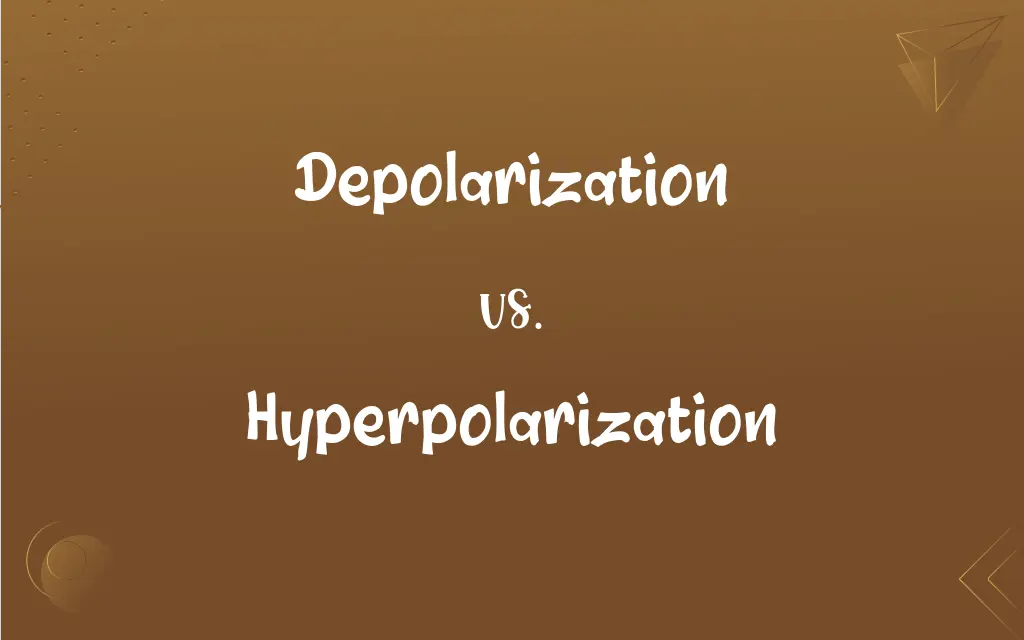Depolarization vs. Hyperpolarization: What's the Difference?
By Janet White || Published on November 26, 2023
Depolarization is the reduction of a cell's membrane potential, making it more positive, while hyperpolarization increases it, making it more negative.

Key Differences
Depolarization is a process in which the membrane potential of a cell becomes less negative (more positive) compared to the resting potential. Hyperpolarization, in contrast, is the process where the membrane potential becomes more negative than the resting potential. Both processes are crucial in the functioning of neurons and muscle cells.
In depolarization, the cell's membrane potential moves towards zero, often leading to action potentials. Hyperpolarization, however, moves the membrane potential further from zero, which inhibits action potentials. Both are critical in regulating the activity of neurons and transmitting signals.
During depolarization, positively charged ions, typically sodium, flow into the cell. In hyperpolarization, the cell becomes more negative due to the efflux of positive ions like potassium or the influx of negative ions like chloride. Both mechanisms are essential for the electrical balance in cells.
Depolarization is often a precursor to cellular activities like muscle contractions or nerve impulses. Hyperpolarization, conversely, often serves as a braking mechanism, preventing excessive neuronal activity. Both are integral to maintaining homeostasis in the nervous system.
Depolarization can trigger a chain reaction leading to the transmission of a nerve impulse. Hyperpolarization typically reduces the likelihood of nerve impulse propagation. These opposite effects are vital for the coordinated activity of the nervous system.
ADVERTISEMENT
Comparison Chart
Membrane Potential Change
Decreases, becoming more positive
Increases, becoming more negative
Ion Movement
Sodium ions typically enter the cell
Potassium ions typically leave, or chloride enters
Effect on Action Potential
Can initiate or propagate an action potential
Prevents or terminates an action potential
Role in Neuronal Activity
Often stimulates neuronal firing
Usually inhibits or regulates firing
Physiological Implications
Associated with excitation in neurons and muscles
Associated with inhibition or resting state in cells
ADVERTISEMENT
Depolarization and Hyperpolarization Definitions
Depolarization
Depolarization refers to a shift towards a less negative electrical state in a cell.
The depolarization of heart muscle cells initiates each heartbeat.
Hyperpolarization
Hyperpolarization involves the movement of a cell's membrane potential away from zero.
Hyperpolarization prevents excessive muscle contractions.
Depolarization
Depolarization is the decrease in membrane potential, making the inside of a cell less negative.
During a nerve impulse, depolarization occurs as sodium ions rush into the neuron.
Hyperpolarization
Hyperpolarization refers to a shift towards a more negative electrical state in a cell.
Hyperpolarization in the brain can inhibit unnecessary neural activity.
Depolarization
Depolarization involves the movement of a cell's membrane potential towards zero.
Muscle contraction is triggered by the depolarization of muscle fibers.
Hyperpolarization
Hyperpolarization is the process of enhancing the electrical difference across a cell membrane.
The hyperpolarization phase follows depolarization in cardiac cells.
Depolarization
Depolarization is a change in a cell's electrical state, often leading to action.
Sensory stimuli often cause depolarization in sensory neurons.
Hyperpolarization
Hyperpolarization is a change in a cell's electrical state, often leading to inhibition.
In the nervous system, hyperpolarization can serve as a signal dampener.
Depolarization
Depolarization is the process of reducing the electrical difference across a cell membrane.
Neuronal depolarization is essential for the transmission of signals in the brain.
Hyperpolarization
Hyperpolarization is the increase in membrane potential, making the inside of a cell more negative.
After a nerve impulse, hyperpolarization helps reset the neuron's state.
Depolarization
To partially or completely eliminate or counteract the polarization of.
Hyperpolarization
The act or process of hyperpolarizing.
Depolarization
To remove magnetic properties from; demagnetize.
Depolarization
The act of reducing polarity, or the result of such action; reduction to an unpolarized or less polarized condition.
Depolarization
An intracellular shift in electrical charge distribution, resulting in less negative charge inside the cell compared with outside; it is essential to the function of many cells, communication between cells, and the overall physiology of an organism.
Depolarization
(sociology) Reduction of political polarization.
Depolarization
The act of depriving of polarity, or the result of such action; reduction to an unpolarized condition.
Depolarization
A loss of polarity or polarization
FAQs
What is hyperpolarization?
It's the process where the cell membrane potential becomes more negative.
What causes hyperpolarization?
Often, the efflux of potassium ions or the influx of chloride ions.
What causes depolarization?
Typically, the influx of sodium ions into the cell.
What happens after hyperpolarization in a neuron?
The neuron typically returns to its resting membrane potential.
How does depolarization affect neurons?
It can initiate or propagate nerve impulses.
Is depolarization a sign of cell activation?
Yes, it often indicates cell activation or excitation.
What role does hyperpolarization play in the heart?
It helps return the heart muscle to a resting state.
What is depolarization?
It's the process where the cell membrane potential becomes less negative.
How does hyperpolarization affect neurons?
It usually inhibits or terminates nerve impulses.
Is hyperpolarization a sign of cell inactivity?
It can indicate cell inhibition or a return to the resting state.
Is hyperpolarization reversible?
Yes, it's a transient state before returning to resting potential.
Does depolarization only occur in neurons?
No, it also occurs in muscle cells and other excitable cells.
Can depolarization spread along the cell membrane?
Yes, it can propagate as a wave along neurons or muscles.
Can depolarization be artificially induced?
Yes, through electrical stimulation or certain chemicals.
What role does depolarization play in the heart?
It triggers heart muscle contraction.
Can hyperpolarization spread along the cell membrane?
It's less likely to propagate but can affect adjacent areas.
What happens after depolarization in a neuron?
It's usually followed by repolarization and potentially hyperpolarization.
Is depolarization reversible?
Yes, cells usually return to their resting state after depolarization.
Can hyperpolarization be artificially induced?
Yes, using techniques like electrical stimulation or pharmacological agents.
Does hyperpolarization only occur in neurons?
While common in neurons, it can occur in other cell types too.
About Author
Written by
Janet WhiteJanet White has been an esteemed writer and blogger for Difference Wiki. Holding a Master's degree in Science and Medical Journalism from the prestigious Boston University, she has consistently demonstrated her expertise and passion for her field. When she's not immersed in her work, Janet relishes her time exercising, delving into a good book, and cherishing moments with friends and family.






































































